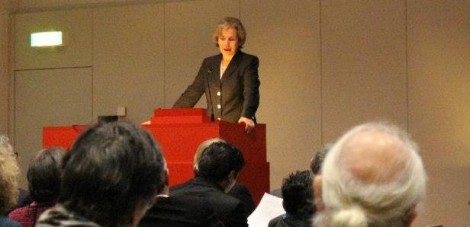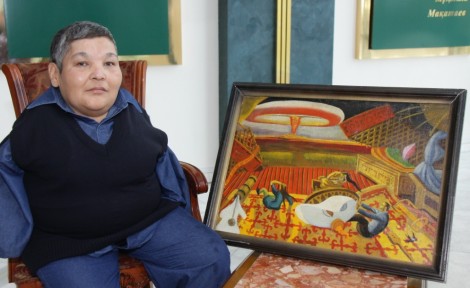PNND and the Basel Peace Office send support
Parliamentarians for Nuclear Nonproliferation and Disarmament (PNND) and the Basel Peace Office welcome the decision taken on 17 November by the Council of Delegates of the Red Cross and Red Crescent movement to step-up their global campaign to abolish nuclear weapons. Citing the catastrophic humanitarian consequences of nuclear weapons and the opinion that any use would be in violation of the principles and rules of international humanitarian law, the movement adopted a resolution and Four-Year Action Plan on nuclear abolition during their assembly in Sydney, Australia.
‘In adopting this resolution the Red Cross and Red Crescent Movement has affirmed that there is virtually nothing that first responders or medical professionals could do to alleviate the uniquely horrific and catastrophic consequences of any use of nuclear weapons,’ says Dr Andreas Nidecker, President of the Basel Peace Office and Board Member of the International Physicians for the Prevention of Nuclear War – Swiss Section. ‘The Council of Delegates has correctly concluded that the only feasible course of action is to prevent any possible use of nuclear weapons by prohibiting and eliminating them.’
This resolution reaffirms the principal call of the Red Cross and Red Crescent movement resolution in 2011 urging all governments ‘to take concrete steps leading to the negotiation of a legally binding international agreement to prohibit the use of and completely eliminate nuclear weapons – based on existing commitments and international obligations – and to conclude such negotiations with urgency and determination.
PNND Co-Presidents Saber H Chowdhury MP (Bangladesh), Senator David Coltart (Zimbabwe), Bill Kidd MSP (Scotland), Mikyung Lee MP (South Korea), Baroness Sue Miller (UK House of Lords) and Uta Zapf MdB (Germany) sent a letter of commendation to Tadateru Konoé (President, International Federation of Red Cross and Red Crescent Societies) and to the presidents of many of the national Red Cross and Red Crescent societies around the world. The letter notes, in particular, the call in the 4 Year Plan for Red Cross and Red Crescent societies to cooperate with parliamentarians to advance a nuclear weapons free world, highlights the cooperation between PNND, ICRC and Red Cross/Red Crescent societies to date, and invites a deepening of thsi cooperation.
The Four-Year action plan adopted by the movement calls on its membership – the 189 national societies of the Red Cross and Red Crescent movement - to take a number of actions including to :
- Transmit the Resolution to relevant government officials, departments and committees as well as to parliamentarians, together with an offer to brief them on the Movement’s concerns and position;
- Host public events (e.g. seminars, conferences, presentations, panel discussions) for parliamentarians, health assistance professionals and other relevant and appropriate actors within civil society;
- Encourage their governments to participate actively in multilateral meetings discussing the humanitarian consequences of nuclear weapons and nuclear disarmament, including the Conference on the Humanitarian Impact of Nuclear Weapons to be held in Mexico (February 2014), the UN Open-ended Working Group on Taking Forward Multilateral Nuclear Disarmament Negotiations (if it continues in 2014), the 2015 Review Conference of the Parties to the Treaty on the Non-Proliferation of Nuclear Weapons and its preparatory meetings, the Conference on Disarmament, and the First Committee of the UN General Assembly, and to take the Movement’s concerns into consideration when developing their positions for such fora.’
The resolution also reaffirms the role of the International Committee of the Red Cross (ICRC) to represent the movement in international deliberating and negotiating forums for nuclear disarmament and to monitor progress in these forums to guide the work of the national societies.

Christine Beerli, Vice-President of the International Committee of the Red Cross (ICRC), speaking at the opening reception of the Basel Peace Office
The Basel Peace Office has already engaged with and/or promoted the ICRC and/or Swiss Red Cross in a number of nuclear abolition events including:
- Symposium: The Humanitarian consequences of nuclear weapons and the imperative for nuclear abolition on 17 Nov 2012;
- Promoting the 2011 Red Cross and Red Crescent resolution in parliaments around the world through an electronic fact sheet (International Humanitarian Law, Nuclear Weapons and Parliamentarians) and by including the resolution in the PNND/IPU Handbook for Parliamentarians on Supporting Nuclear Non-proliferation and Disarmament;
- Swiss Youth Bans the Bomb conference in Heiden, organised by IPPNW-Switzerland, Swiss Red Cross and a number of other Swiss organisations (see also A bell, a bomb and a ban? Swiss and Japanese youth join together for nuclear disarmament);
- Organising a study visit of the Basel University Seminar fur Soziologie graduate course to the ICRC on 14 November 2013.

Karipbek Kuyukov, armless painter and second generation victim from nuclear tests, spoke at Basel Peace Office symposium on humanitarian consequences of nuclear weapons
‘The latest resolution and work-plan adopted by the Red Cross and Red Crescent Movement opens the door to increased action by national Red Cross and Red Crescent societies in cooperation with parliamentarians and civil society,’ says Dr Nidecker. ‘This should now move governments to begin the multilateral negotiations to prohibit and eliminate nuclear weapons.’
